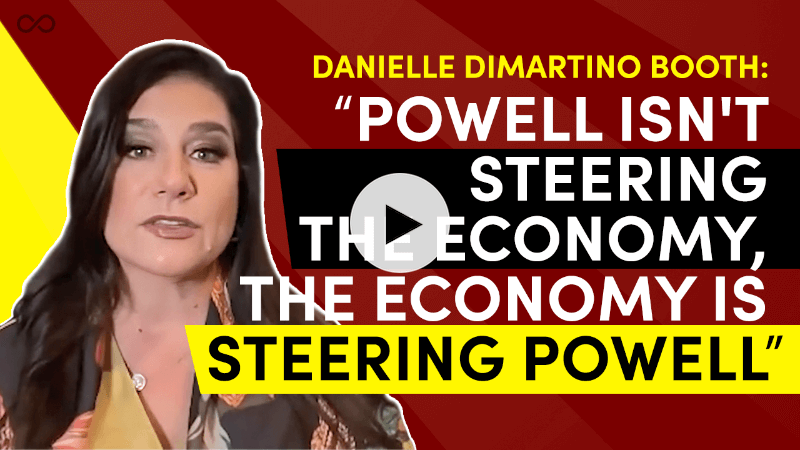Will Dollarization Make Argentina Great Again?
This week, we were joined by former Fed insider Danielle DiMartino Booth on the Paradigm Press YouTube Channel.
She revealed what you might not be seeing in this market environment, why a commercial real estate collapse will tank residential house prices, and how the Fed’s latest moves will play out in 2024. Plus, she gave ways you can make sure you’re prepared for what’s to come.
You can check out that interview by clicking below…

[https://www.youtube.com/watch?v=kaxQAOHG7lc]
And tomorrow, Matt Insley will talk with Jim Rickards about the Biden-Xi Summit that happened last week and why it was such a disaster.
To be notified when that interview goes live, make sure you subscribe and click “all” notifications so you can be the first to know when we upload!
Speaking of foreign leaders…
Libertarians the world over wet their pants in unison — not collectively, mind you —when Javier Milei won the Argentine presidency on Sunday.
I must admit I was gleeful, as nothing makes me happier than The Left taking one in the gooey bag (or whatever they’ve got in their pronoun pants nowadays).
But upon closer inspection, should I — or anyone else — be overly hopeful that Milei will deliver Argentina from its inflationary evil?
Let’s face it: his policies are contradictory.
He called the world’s second-largest economy and largest military power China an “assassin” and embarrassed Brazilian President Lula da Silva by saying Argentina would not enter BRICS.
This is despite Lula’s heavy lobbying for his reluctant partners to drop Algeria in favor of Argentina. “How many Arab countries are we taking in? Wouldn’t a South American country that partially controls the southern sea routes around the continent be better?”
India was thrilled, as France pushed them hard to reject the Algerian application. Apparently, India owed France, Algeria’s ever-beneficent former colonial overlord, some favors. Algeria was not pleased, to say the least.
Milei also wants to drop the peso, adopt the dollar, and be America’s (and Israel’s) unquestioning partner.
Let’s get this straight: he wants to burn down his own central bank (Praise Ron Paul! Hallelujah!)… but wants to adopt the currency of a country over whose central bank he has no control.
And worse, that central bank has absolutely no obligation to consider Argentina’s position when making its decisions. Heck, it barely takes into account what’s best for Americans!
If Donald Trump doesn’t get back in the Oval Office in 2025, Milei’s plan will be in tatters.
But let’s leave the politics for now and look at the economics.
I’m neither a South American political expert nor an Argentinian economic expert. But we can still make a few inferences about Milei’s plans by looking at what he wants to do, where it’s been done before, and how successful it’s been.
And with all the talk of de-dollarization, Argentina looks to buck that trend by dollarizing its economy. What does that even mean?
What Is Dollarization and Why Do It?
First, let’s define the term. Dollarization of an economy refers to a situation where a country adopts a foreign currency, usually the U.S. dollar, in addition to, or instead of, its own national currency. This can happen in various forms:
Official dollarization is when the foreign currency becomes the sole legal tender. The country gives up its own currency and fully adopts the U.S. dollar for all financial transactions. This is a more permanent and comprehensive form of dollarization.
Unofficial or partial dollarization is when the U.S. dollar is used alongside the national currency. It often occurs in countries with high inflation or unstable local currencies. People and businesses may prefer to use dollars for savings, transactions, or pricing goods, although the national currency remains legally in circulation.
Financial dollarization is what happens when residents of a country hold a large portion of their assets (like bank deposits and loans) in dollars, even if everyday transactions are still carried out in the local currency.
The reasons for dollarization vary. It’s often seen as a way to stabilize an economy, especially in countries with a history of hyperinflation or monetary instability. This is the most obvious reason Milei would opt for dollarization. Argentina’s economy is massively export-dependent. Removing the volatile Argentine currency from the buying decision would at least temporarily increase exports.
Also, by adopting a stable, internationally recognized currency like the U.S. dollar, these countries can reduce inflation and interest rates, and potentially attract more foreign investment.
But dollarization has downsides.
Countries lose control over their monetary policy, including the ability to print money or adjust interest rates to respond to economic changes. This is akin to a loss of sovereignty. If you don’t own your currency, you don’t run your country. Just ask anyone in the eurozone.
Dollarized countries also don’t earn seigniorage, the profit made from issuing currency. That stays at the Federal Reserve.
Dollarization has been adopted in various forms by countries in Latin America, Southeast Asia, and other regions. Examples include Ecuador and El Salvador, where the U.S. dollar is the official currency, and others like Cambodia or Lebanon where the dollar is widely used alongside the national currency.
Examples of Dollarized Economies
Here are some examples of countries adopting currencies other than their own.
- Ecuador adopted the U.S. dollar in 2000 after a severe banking crisis and hyperinflation. Dollarization helped stabilize the economy, brought down inflation, and restored confidence in the financial system. However, it also meant that Ecuador lost control over its monetary policy.
- El Salvador dollarized in 2001 to stabilize its economy and encourage investment. The move helped to reduce inflation and interest rates, and it simplified trade and financial transactions with the U.S., a major trade partner. But like Ecuador, El Salvador relinquished control over its monetary policy. Except now, El Salvador adopted Bitcoin as legal tender, locked up all its criminals, and looks like Valhalla as a result!
- Panama has used the U.S. dollar alongside its own currency, the Balboa, for over a century. This unique system has contributed to Panama’s financial and banking sector stability and has made it an attractive destination for international business and finance.
- Zimbabwe. After experiencing hyperinflation in the late 2000s, Zimbabwe adopted a multi-currency system that included the U.S. dollar. This helped to restore value and stability to the currency system, though the country still faces numerous economic challenges.
- Montenegro and Kosovo have adopted the Euro unofficially. While not unique examples of dollarization (since they use the Euro), their experiences are similar. Adopting a stable, internationally recognized currency helped stabilize their economies post-conflict, though they also face the limitations of not having control over their monetary policy.
In these cases, dollarization brought immediate benefits like stabilizing prices, attracting foreign investment, and enhancing the credibility of the financial system.
However, long-term success is more complex and involves trade-offs, such as losing the ability to conduct independent monetary policy and being vulnerable to economic conditions in the issuing country (like the U.S. for the dollar).
The overall impact of dollarization varies widely based on the specific circumstances of each country.
What’s “Losing Control Over Monetary Policy?”
We’ve mentioned that phrase quite a few times already. But what does it mean?
“Losing control over monetary policy” is a significant consequence of dollarization.
Monetary policy refers to the actions a central bank or monetary authority takes to manage the supply of money and interest rates in an economy.
It’s a key tool for influencing economic activity, inflation, and exchange rates. When a country adopts another currency, like the U.S. dollar, as its official currency, several things happen:
No Control Over Interest Rates: The country cannot set its own interest rates. It’s tied to the interest rate decisions made by the foreign central bank – the Fed and Jay Powell – whose currency it has adopted. For example, if Ecuador, which uses the U.S. dollar, wants to change interest rates to stimulate its economy or control inflation, it cannot; it’s subject to the U.S. Federal Reserve’s decisions.
Cannot Print Money: The country loses the ability to print its own currency. Normally, I’d love this, because it means the country cannot use tools like quantitative easing (increasing money supply) to stimulate the economy during a downturn. But just ask Italy, Spain, and Greece how they feel about this inability. It’s particularly challenging during economic crises when the country might need to inject more money into the economy.
Reduced Ability to Respond to Economic Shocks: With dollarization, a country’s capacity to react to local economic conditions is limited. For example, if the economy is in a recession, the country cannot devalue its currency to make its exports cheaper and stimulate growth, as the currency value is determined by the foreign central bank’s policies. Again, southern Europe knows this all too well.
Loss of Seigniorage: Seigniorage is the profit a government earns from issuing its own currency, especially when the cost of producing money is less than its value. By using a foreign currency, the country forgoes these potential earnings. The best place to read about this is Garet Garrett’s The Bubble That Broke the World. In it, Garrett writes about how the Bank of England made GBP 400 million per year in seigniorage and how the United States wanted to wrest what the French now call “the exorbitant privilege” from the British.
Wrap Up
In summary, dollarization can provide stability and reduce inflation, but it comes at the cost of losing crucial tools to independently manage an economy. This makes a country more vulnerable to external economic changes over which it has no control.
Perhaps Milei thinks this is the most obvious way to get his country back on track. But it’s fraught with risk and contradicts his free market rhetoric.
Still, I wish him luck.
And to you and yours, I wish you a very Happy Thanksgiving!


Comments: